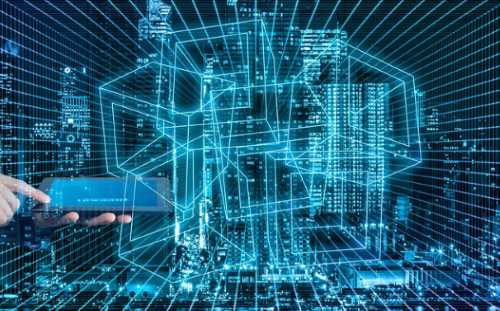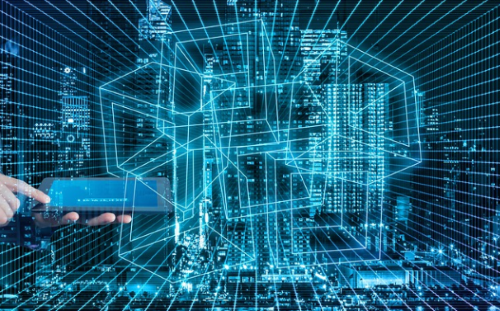


Image Source: Pixabay
Bloktopia taking virtual reality on the Blockchain 21 notches higher
Built and backed on the Polygon network, Blokatopia is one of the biggest projects in the Metaverse. This project is providing a Virtual Reality experience for the cryptocurrency ecosystem, by bringing all crypto players together in one immersive and engaging community.
According to research carried out by Zion Market Research, the VR and Augmented Reality (AR) markets are expected to be valued at approximately $814.7 billion by 2025. This points to the fact that 2022 is going to be a big year for the metaverse and Bloktopia has already positioned itself as one of the biggest players in the ecosystem.
Bloktopia like every blockchain project has its Token known as $Blok which users of the platform will be able to buy on various Centralized and Decentralized exchanges. This native token will also be used to purchase virtual Real Estates. Holders of $Blok have the advantage of benefitting from the various concepts in the Bloktopia ecosystem. Read More
Top 5 blockchain trends for 2022 and beyond
Looking beyond this year’s headlines like El Salvador’s Bitcoin adoption, here are the key developments in blockchain technology that will have lasting impact in the new year and beyond.
Blockchain, the underlying infrastructure behind cryptocurrencies, is likely among the most transformative technological innovations of our age, with promising use cases for many industries.
In a nutshell, blockchain is an open and censorship-resistant database model, secured by encryption and decentralization. Blockchain records information in blocks on a shared ledger, storing a synchronized copy of it on all the systems participating in the network, hence assuring its immutability.
As companies start recognizing the benefits of this technology, we’ve seen exciting new blockchain developments this past year. Below we’ll take a look at five of the biggest blockchain trends of 2021 and what they might mean for the next year. Read More
Russia’s Largest Bank Launches A Blockchain ETF
Russia is entering the ETF game with Sberbank’s Blockchain Economy ETF (SBBE). The exchange-traded fund would track Sberbank’s Blockchain Economy Index and would be listed on Russia’s stock market.
The ETF gives Russian stock market traders and investors indirect exposure to blockchain-invested companies, such as crypto asset managers, mining firms, and blockchain advisory enterprises. For instance, the Sber Blockchain Economy Index tracks the performance of Coinbase, asset manager Galaxy Digital, and blockchain software company Digindex, among other blockchain-based entities.
The news was confirmed via a statement from Sberbank’s Asset Management, noting that the offering would grant investors exposure to the “blockchain economy without the difficulties associated with the direct development, purchase, storage, and sale of digital assets.”
“Direct investments in crypto assets involve high risks, it is difficult to assess them independently. Therefore, we offer to invest not in crypto assets, but in companies that ensure the development of blockchain technologies. The exchange fund is available to anyone thanks to its simplicity and low entry threshold.” General Director of Sberbank Asset Management, Evgeny Zaitsev, added. Read More
Bholdus Blockchain Finally Goes Live in Mainnet, Shares Web3, and Metaverse Ambitions
Bholdus, a new-gen blockchain platform, just activated the inaugural version of its mainnet smart contracts. As such, Bholdus is ready to onboard decentralized applications of all sorts.
Bholdus mainnet v1.0 launches to change the narrative in NFTs and DeFi
According to the official announcement shared by the Bholdus (BHO) blockchain team, its mainnet version went live on Dec. 30, 2021. This release marks the full-fledged release of Bholdus’ cross-chain heterogeneous infrastructure.
This milestone is a crucial one for the progress of the entire Web3.0 segment as Bholdus (BHO) leverages a new-gen Nominated Proof of Stake (NPoS) consensus mechanism. This solution is far more resource-efficient compared to existing mainstream alternatives Binance Smart Chain, Ethereum, Polygon, and Solana. Read More

The Serial Entrepreneur And Humanitarian Improving And Enriching People’s Lives.
Completing the trinity of co-founders at Elrond is Lucian Todea, bringing his skill set to the table serving as Chief Operating Officer (COO). He is the epitome of entrepreneurship and an active investor in startups and the Blockchain space, with more than 15 years of experience in technology-related businesses. This article will highlight Lucian Todea’s achievements and essential role at Elrond.
Lucian Todea is an entrepreneur, angel investor, and technology industry executive with significant experience spanning operational practice, business development, general management, and leadership. With his international savoir-faire, he has many accolades to his name.
Working alongside Beniamin Mincu and Lucian Mincu, he complements the humanitarian ethos embedded in the Elrond culture and narrative.
Passionately cited by Lucian Todea,
“Technology was never about technology, but about improving and enriching people’s lives.” Read More
KardiaChain (KAI) – The First Interoperable Blockchain
KardiaChain (KAI) is a blockchain platform that aspires to be fully interoperable and “non-invasive”. It means that blockchains can join the network without modifying their own protocols. KardiaChain has a dual-node topology that allows it to link to other blockchains, as well as sharding for scalability and smart contracts for developers.
The platform is powered by KAI, a native token that may be used for staking, transaction fees, service participation, and smart contract deployment.
The mainnet of KardiaChain became operational in December 2020, after it was initially announced in October 2018.
KardiaChain claims to be the first blockchain that is completely non-invasive and interoperable. It accomplishes this primarily through its dual master node technology, which allows the blockchain to access both its own ledger and those of other platforms at the same time. This enables KardiaChain (KAI) to work alongside other blockchains without asking them to change their protocols or technologies. Dual nodes may be controlled by anyone, making them permissionless, and feature a consensus mechanism to check data from both chains, according to the whitepaper. Read More
How Polygon Averted An Industry-Wide Disaster
Polygon, a Layer 2 scaling network based on Ethereum, has kept its silence for almost a month about a critical vulnerability that almost destabilized its ecosystem, with roughly $24 billion worth of MATIC, its native token, put at risk because of an external threat actor.
While Polygon has done a great job at keeping the situation under wraps for almost a month, when things have started to clear up and its protocol's security engineers have signaled that the coast was clear, the protocol went on to release what can be deemed as a post-crisis report.
Polygon quietly pushed an update to its network, and with it, a crucial fix was shipped to all its nodes and validators. Read More
DAOs are the foundation of Web3, the creator economy, and the future of work
DAOs are a defining construct for everything that comprises the new decentralized internet, or Web3, and the emerging crypto economic system.
Decentralized autonomous organizations (DAOs) started out as a simple concept envisioned as organizations, created by an idea and fueled by developers, that automate business functions and processes by leveraging smart contracts and all the fundamental tenets of blockchain. The core idea was to flatten the complex business process that various organizations are mired in and facilitate the movement of assets to a very future-oriented digital interaction that needed no intermediaries — promising faster, cheaper, and more transparent transaction processing.
By replacing many intermediaries, the DAOs themselves acted as digital intermediaries that provide transparency and scale, giving them the stature of an organization without the traditional organizational constructs of entities, groups, management, charters, and other forms of collective action. While the traditional centralized organizational structure is being challenged, the key organizational elements that remain are fueling a new economic revolution that is giving birth to a new creator economy and bringing artists, lawyers, developers, and creators together from all around the globe to create ideas and monetize them at a global scale in permissionless crypto-economic systems built upon blockchain and Web3 technologies — and essentially defining the future of work. Read More
NFTs to help brewers and farmers preserve UNESCO Belgian beer heritage
As a part of the partnership, Zeromint will mint and offer exclusive NFTs on the GoChain blockchain, which will be made available for international beer fans via BBA.
Brewers and farmers from Belgian Barrels Alliance (BBA) have partnered with Zeromint to offer nonfungible tokens (NFTs) aimed at preserving the UNESCO recognized Belgian beer culture and heritage.
As a part of the partnership, Zeromint will mint and offer exclusive NFTs on the GoChain blockchain, which will be made available for international beer fans via BBA. Starting Monday, the organization will run several BBA NFT collection projects around sustainability and the preservation of Belgian beer heritage for the next 14 days.
According to the official statement, the first Belgian Barrels NFT auction will be used to recruit eleven participants for acting in a BBA-produced movie titled Belgian Barrels:
“The aim of the movie project is to further eternalize the Belgian Beer history through a professional cinematic movie production, which BBA plans to promote and distribute globally.” Read More
Disclaimer: These articles are provided for informational purposes only. They are not offered or intended to be used as legal, tax, investment, financial, or any other advice.
